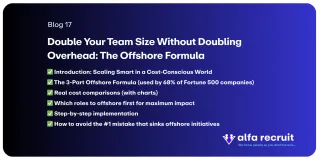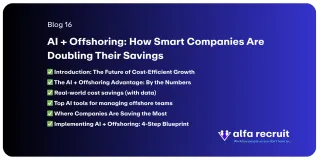Your Trusted Global Partner for
End-to-End Offshoring & Outsourcing Solutions
We Hire, Train, and Manage Top Offshore Talent for you !
How to Offshoring/Outsourcing ?
Step 1
Collaborate
We discuss your remote staffing requirement.
Step 2
Recruit
We recruit and employ your team according to your requirements.
Step 3
Support
Get 24/7 support from us. We support operation of your offshore team.
Industries We Serve













Our Products
1. Alfa Recruit Pro
Full-Circle Offshore Recruitment
Hire, train, and manage top global talent while cutting costs by up to 70%
Full-Cycle Hiring Support
From sourcing and screening to onboarding and payroll management.
Expert Resume Sourcing & Screening
Find the best-fit candidates faster and smarter.
Administrative Support for Recruitment Agencies
Streamline hiring, compliance, and database management.


2. Alfa Infotech
AI-Driven Sales & Marketing
From lead generation to CRM automation, we boost conversions while cutting operational costs by up to 40%
Smart Automation & AI Solutions
AI chatbots, voice bots, and automated funnels work 24/7 to engage customers, qualify leads, and drive revenue.
Outsource Smarter, Not Harder
Alfa Recruit’s AI-powered Sales & Marketing teams help you scale campaigns, close deals faster, and maximize ROI with top global talent.
Who We Help
Tech, SaaS, eCommerce, Healthcare, Finance, and growing businesses looking to scale without overhead.
3. Alfa Finpro
Payroll Processing & Management
Streamlined payroll for employees, contractors, and temporary staff, including tax filings and compliance.
Bookkeeping & Accounts Management
Accurate transaction recording, AP/AR management, and customised financial dashboards for real-time insights
Tax Compliance & Advisory
Proactive tax strategies, preparation, filing, and audit support to minimize liabilities and ensure compliance.
Financial Reporting & Analysis
Data-driven insights with P&L statements, KPI tracking, budgeting, and forecasting for informed decisions.
CFO & Advisory Services
Expert financial guidance on cash flow optimisation, cost reduction, M&A support, and scalable frameworks for growth.


4. Alfa E-commerce
Full-Service E-Commerce Management
From product listings to fulfilment, we handle everything so you can focus on scaling your brand.
TikTok Shop Experts
Maximise sales with live shopping, influencer marketing, and AI-driven ad strategies that convert views into revenue.
End-to-End E-Commerce Support
Drop shipping, SEO, payment gateways, and multi-platform management for Shopify, Amazon, and more.
Data-Driven Growth Strategies
We optimise trends, automate sales, and
boost ROI with analytics-backed decision-making.
Our Mission & Vision
The Mission
At ALFA RECRUIT, our mission is to transform the way businesses operate by delivering intelligent, customised outsourcing solutions that blend cutting-edge AI technology with human expertise. We help organisations streamline operations, reduce costs, and boost efficiency—all while maintaining a personal touch that fosters meaningful connections and lasting success.
By integrating AI-driven tools with human insight, we provide scalable, practical solutions that adapt to real-world challenges. Our goal is not just to deliver results, but to build strong, trusted partnerships that drive growth, innovation, and smarter business solutions.
The Vision
We envision a future where businesses
seamlessly integrate technology and human expertise to unlock new opportunities, save resources, and gain a competitive edge.
At ALFA RECRUIT, we believe that AI should enhance human potential—not replace it.
Our goal is to bridge the gap between automation and human insight, empowering businesses with smarter decisions, greater efficiency, and sustainable growth. We don’t just adapt to change —we anticipate, embrace, and transform it into opportunities for innovation and success.
At ALFA RECRUIT, we’re not just outsourcing solutions
—we’re reshaping the future of work
.

Alfa Recruit's Pricing Guarantee
Unlock your outsourcing potential - no surprise, just results.




Ask an Outsourcing Expert –
Get Free Advice!
Not sure if outsourcing is the right fit for your business?
Our team of offshoring specialists is here to help!
From pricing models and team setup to hiring the right talent and scaling efficiently, we’ll answer all your questions—no obligation, just expert insights.
Fill Out This Quick Form !
We Are Here to Help You Optimise Your Business Operations.
At AlfaRecruit, we specialise in providing top-tier outsourcing and offshoring solutions designed to enhance your business efficiency and reduce operational costs. Our mission is to help you focus on your core business activities while we handle the rest, ensuring you get the most out of your resources.

Have questions or need assistance?
We’re here to help!

Our Commitment to You
Tailored Solutions: We offer customised outsourcing and offshoring services that align with your specific business needs and goals.
Expert Team: Our skilled professionals are dedicated to delivering high-quality services, from customer support to back-office operations.
Proven Success: With a track record of excellence, we have helped numerous businesses streamline their operations and achieve significant cost savings.

Why Choose AlfaRecruit?
Comprehensive Services: We provide a wide range of outsourcing and offshoring services, including IT support, HR management, and financial services.
Global Reach: Our offshoring solutions connect you with talented professionals worldwide, ensuring you have access to the best talent.
Continuous Improvement: We are committed to ongoing support and optimisation to ensure your business operations remain efficient and effective.
Latest Insights From Alfa Recruit
Double Your Team Size Without Doubling Overhead: The Offshore Formula
Want to grow your team without ballooning costs? Discover the Offshore Formula top companies use to double their workforce while slashing overhead by up to 60%. This blog reveals real salary compariso... ...more
Recruitment & HR Outsourcing
June 09, 2025•6 min read

AI + Offshoring: How Smart Companies Are Doubling Their Savings
🚀 Discover how forward-thinking companies are combining AI with offshoring to cut hiring costs by up to 70%—without compromising on quality. From automated screening to global payroll tools, this gui... ...more
Recruitment & HR Outsourcing
June 06, 2025•7 min read






